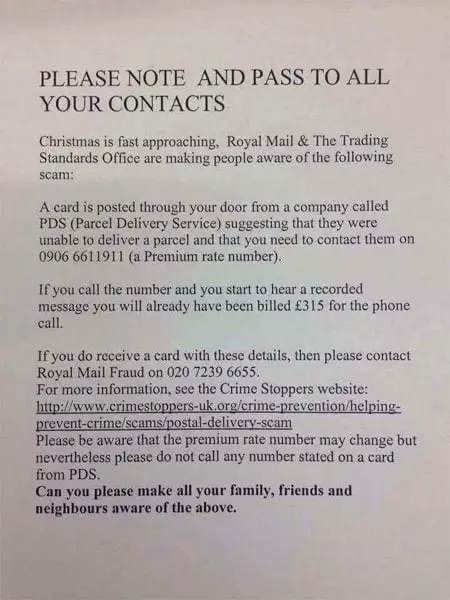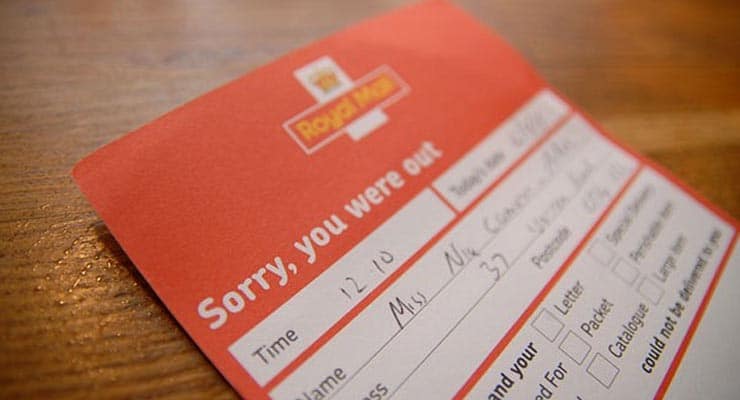Can calling premium number on fake delivery card cost £315? Fact Check
Messages online warn of a scam where a card is posted through a victim’s door claiming to be from the Parcel Delivery Service explaining that a parcel could not be delivered and urges the victim to call a phone number that charges hundreds of pounds per minute.
 OUTDATED AND INACCURATE
OUTDATED AND INACCURATE
The warning claims to come from Royal Mail and the Trading Standards Office. Popular versions of the message claim the victim could be charged as much as £315 just for calling the premium rate number. The warnings typically spread online during the latter part of the year as Christmas approaches.
However the warnings are both inaccurate and outdated. Some examples of the warnings can be seen below –

Can you circulate this around especially as Xmas is fast approaching – it has been confirmed by Royal Mail. The Trading Standards Office are making people aware of the following scam:
A card is posted through your door from a company called PDS (Parcel Delivery Service) suggesting that they were unable to deliver a parcel and that you need to contact them on 0906 6611911 (a Premium rate number).
DO NOT call this number, as this is a mail scam originating from Belize. If you call the number and you start to hear a recorded message you will already have been billed £315 for the phone call.
If you do receive a card with these details, then please contact Royal Mail Fraud on 020 7239 6655
collected March 2016
PLEASE NOTE AND PASS TO ALL YOUR CONTACTS
Christmas is fast approaching. Royal Mail & The Trading Standards Office are making people aware of the following scam:
A card is posted through your door from a company called PDS (Parcel Delivery Service) suggesting that they were unable to deliever a parcel and that you need to contact them on 0906 6611911 (a Premium rate number).
If you call the number and you start to hear a recorded message you will already have been billed £315 for the phone call.
If you do receive a card with these details, then please contact Royal Mail Fraud on 020 7239 6655.
For more information, see the Crime Stoppers website:
Please be aware that the premium rate number may change but nevertheless do not call any number stated on a card from PDS.
collected January 2017
While we have seen both of the examples above spreading across social media since around 2011, none of these warnings accurately describe a current threat. Searching the Internet does reveal a similar scam that operated in 2005 within the UK, whereby a company in Belize was sending out fake delivery cards that urged recipients to call a premium phone number.
But that scheme was sooned shut down by the Phone-paid Services Authority (PSA) which was formerly PhonepayPlus, formerly the ICSTIS. The company behind the scheme was subsequently fined £10,000.
PhonepayPlus (now Phone-paid Services Authority) confirmed in a statement in 2011 that the scheme has not been operational since December 2005, and that email recipients should disregard any chain emails or messages warning of such a scam.
– The service is NO LONGER running and has NOT been running since December 2005.
– You do NOT need to contact PhonepayPlus, or the Royal Mail, about this service as it was stopped almost six years ago.
– If you receive a copy of the email warning you about the alleged scam, please do NOT forward it to others. Instead, please forward this statement from PhonepayPlus.
It is also certainly worth noting that the above warnings – which quote extraordinarily high costs for calling a premium number like £315 – would not have been accurate, even if they had been circulated when this scheme was operating. There are no tariffs in the UK (or elsewhere) that can impose such high costs per minute, whether the call is a premium rate number or an international call.
Sponsored Content. Continued below...
This site lists many of the per minute costs associated with premium rate numbers, and lists the most expensive tariff as around £4.50 per minute. International costs can depend on the phone provider used and many providers cap the charges per day. Which? lists many of these costs here. However, no tariff or provider costs come anywhere near the amounts quoted in these warnings.
Despite this scam being shut down a long time ago and never resurfacing, warnings about it have long been spread via both email and social media, usually towards the latter part of the year as Christmas nears.
Since there is no sign that such a scam has returned, there is little reason to continue spreading the above messages.
Despite the longevity of the warnings, this scam isn’t something that is happening, and as such we don’t recommend spreading the warning. If you do ever receive a suspicious postal card with a number on it that you don’t trust, you can call PSA on 0300 30 300 20 (UK readers) for more guidance.
Continued below...
Thanks for reading, we hope this article helped, but before you leave us for greener pastures, please help us out.
We're hoping to be totally ad-free by 2025 - after all, no one likes online adverts, and all they do is get in the way and slow everything down. But of course we still have fees and costs to pay, so please, please consider becoming a Facebook supporter! It costs only 0.99p (~$1.30) a month (you can stop at any time) and ensures we can still keep posting Cybersecurity themed content to help keep our communities safe and scam-free. You can subscribe here
Remember, we're active on social media - so follow us on Facebook, Bluesky, Instagram and X
